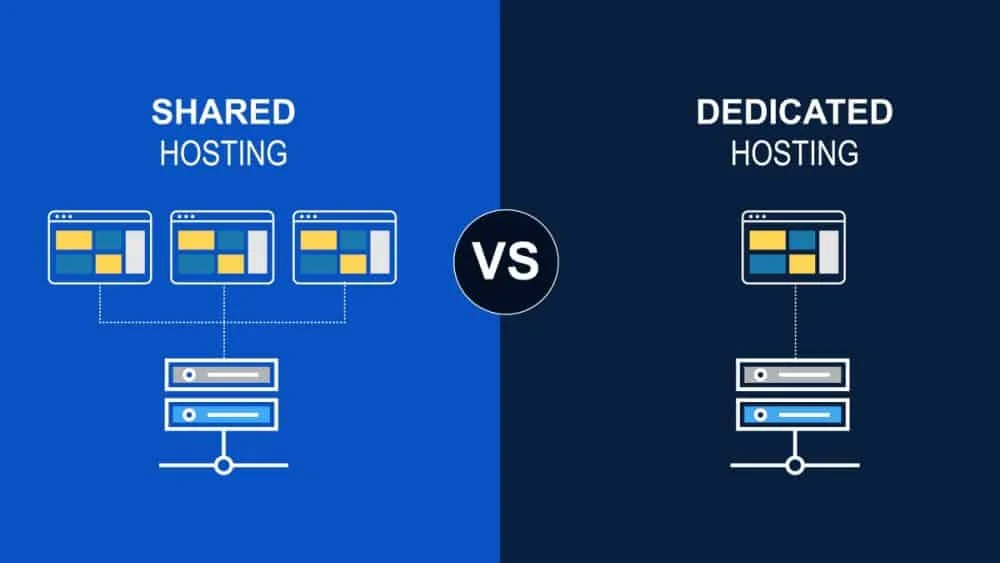Introduction
In the digital age, having a strong online presence is essential for businesses and individuals alike. To establish this presence, web hosting plays a crucial role. Among the various hosting options available, two primary contenders stand out: Shared Hosting vs Dedicated Hosting Each comes with its own set of advantages and drawbacks, catering to different types of websites and their requirements.
Shared Hosting: Affordable Convenience
Shared hosting is akin to sharing a house with roommates – you all occupy the same space, sharing resources like utilities and space. In the hosting realm, multiple websites share the same server and its resources, including processing power, memory, and storage. This makes shared hosting an economical option, ideal for beginners, small businesses, and personal websites.
Dedicated Hosting: Unleash Your Website’s Potential
Dedicated hosting is comparable to owning your own home – you have the entire space and resources at your disposal. With dedicated hosting, your website is the sole occupant of the server, ensuring optimal performance and customization.
Difference between shared hosting and dedicated hosting


Shared hosting
- Cost-Efficiency: Shared hosting is budget-friendly, making it an excellent choice for those starting out with limited resources.
- Ease of Management: The hosting provider takes care of server maintenance, updates, and security, saving you time and effort.
- Technical Expertise Not Required: You don’t need advanced technical skills to manage your website on shared hosting, making it accessible for beginners.
- Limited Resources: Sharing resources can lead to slower loading times and performance issues if neighboring websites experience high traffic.
- Security Concerns: Security vulnerabilities in one website can potentially impact others on the same server.
- Scalability Challenges: As your website grows, shared hosting might not provide the necessary resources to handle increased traffic and data demands.
Dedicated hosting
- Enhanced Performance: Your website benefits from dedicated resources, resulting in faster loading times and smoother navigation.
- Customization: You have full control over server settings, software, and configurations, allowing you to tailor the environment to your needs.
- Higher Security: Since you’re not sharing server space, the risk of security breaches due to neighboring websites is eliminated.
- Scalability: Dedicated hosting can accommodate the growth of your website, ensuring it remains responsive even as traffic increases.
- Higher Cost: Dedicated hosting comes at a premium price due to exclusive access to resources and features.
- Technical Expertise: Managing a dedicated server requires more technical know-how or the option to hire professionals for server administration.
- Responsibility for Maintenance: You’re responsible for server updates, security patches, and general maintenance tasks.
Choosing the Right Fit:
The decision between Shared Hosting vs Dedicated Hosting. ultimately boils down to your website’s specific needs and your budget. If you’re just starting, have limited resources, and seek a hassle-free approach, shared hosting is an excellent starting point. However, for websites expecting heavy traffic, requiring customization, and valuing performance, dedicated hosting is the ideal route.
Conclusion
shared hosting offers affordability and convenience, while dedicated hosting empowers you with unparalleled control and performance. Weigh the pros and cons carefully, considering your website’s current state and future growth plans. With the right hosting choice, you can lay a solid foundation for your online presence and provide visitors with an exceptional user experience.
Shared Hosting vs Dedicated Hosting options, there’s a third contender worth exploring: cloud hosting. Cloud hosting harnesses the power of multiple interconnected servers, ensuring flexibility, reliability, and scalability. This modern solution lets you pay for the resources you use, making it cost-effective. It combines the advantages of shared hosting’s cost-efficiency and dedicated hosting’s performance, allowing you to scale resources up or down as needed. Cloud hosting is perfect for businesses with fluctuating demands, offering a balance between affordability and high performance. Consider cloud hosting as a dynamic alternative tailored to evolving digital landscapes.

